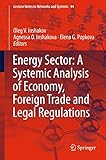Energy Sector: A Systemic Analysis of Economy, Foreign Trade and Legal Regulations [electronic resource] / edited by Oleg V. Inshakov, Agnessa O. Inshakova, Elena G. Popkova.
Contributor(s): Inshakov, Oleg V [editor.] | Inshakova, Agnessa O [editor.]
| Inshakova, Agnessa O [editor.] | Popkova, Elena G [editor.]
| Popkova, Elena G [editor.] | SpringerLink (Online service)
| SpringerLink (Online service) .
.
Material type:  BookSeries: Lecture Notes in Networks and Systems: 44Publisher: Cham : Springer International Publishing : Imprint: Springer, 2019Edition: 1st ed. 2019.Description: XIII, 245 p. 9 illus. online resource.Content type: text Media type: computer Carrier type: online resourceISBN: 9783319909660.Subject(s): Energy policy
BookSeries: Lecture Notes in Networks and Systems: 44Publisher: Cham : Springer International Publishing : Imprint: Springer, 2019Edition: 1st ed. 2019.Description: XIII, 245 p. 9 illus. online resource.Content type: text Media type: computer Carrier type: online resourceISBN: 9783319909660.Subject(s): Energy policyImportance and Sources of Legal regulation of Foreign Trade Activities and Turnover of Energy Resources -- Basic Concepts of Legal Regulation of Foreign Trade Activities of Energy Resources Turnover -- Foreign Trade Contracts as a Contractual Basis for International Civil Circulation of Energy Resources: Concept, Types, Content -- Applicable Law as an Essential Condition for a Foreign Trade Contract for the Supply of Energy Resources -- Innovation as an Integral Condition for the Development of Modern Foreign Trade Turnover of Energy Resources and its Legal Regulation -- Innovative Technologies of Oil Production: Tasks of Legal Regulation of Management and Taxation.
This book is a comprehensive economic and legal study of the theoretical and practical aspects of the problems of increasing energy efficiency; self-motivation of energy saving by business entities within the framework of their corporate responsibility; regulatory mechanisms to stimulate energy conservation in the economy; civil-law regulation of foreign trade turnover of energy resources between economic entities of the Russian Federation and companies of member states of international integration associations – the CIS, EEMP, the EU and BRICS. It argues that technological energy saving plays a key role in reducing the energy intensity and increasing the energy efficiency of the economy, and substantiates the need for institutional support – including legal support for the participation of the Russian Federation – in various forms of international cooperation. Lastly, based on an analysis of current legislation, programs and recommendations, judicial and contractual practices, customs and trade procedures, it offers proposals for the developing, improving and unifying civil law regulation of obligations in the sphere of international trade in energy resources, as well as methodological recommendations for drafting foreign trade contracts in the energy sector.


There are no comments for this item.